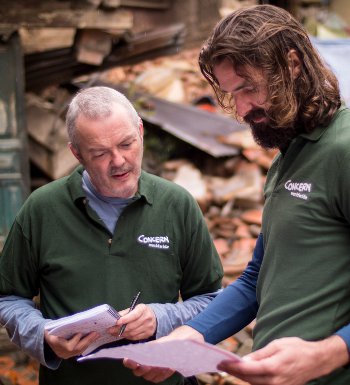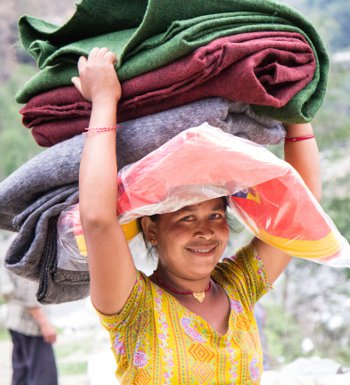I flew into Kathmandu a few days after it was rocked by the big earthquake of April 25th.
Now, three weeks on, my job as head of Concern Worldwide’s emergency response team in Nepal is over and I’m heading back to the airport with mixed feelings.
I have been here before - trekking in the foothills of the Himalayas - and came to know the people of rural Nepal as being warm, generous, and amazingly tenacious. Eking out a subsistence living, growing rice, potatoes, and maize on a steep hillside, far removed from the luxuries of modern life, certainly breeds tenacity. And these people will need it in abundance in the day, months and years ahead.
 Concern Worldwide's Humanitarian Coordinator, Ros O'Sullivan, left, discusses the Nepal earthquake response plan with logistician Grahan Woodcok.
Concern Worldwide's Humanitarian Coordinator, Ros O'Sullivan, left, discusses the Nepal earthquake response plan with logistician Grahan Woodcok.This country has been hammered. Twice. The second tremor, on May 12th, brought with it an amazing amount of destruction in areas which had been badly shaken first time around.
Well over half a million homes have been turned to rubble, leaving hundreds of thousands of families stunned and exposed to the elements.
Those who died have been honoured and memorialised. Their loved ones must now find a way to pick up the pieces of their own shattered lives and carry on. And they’re doing it in a land that still continues to shudder and groan beneath their feet.
The task ahead is huge. Aid organisations like Concern have grappled with difficult logistics in an effort to get emergency supplies to those who need it most. And that aid has now started to flow through the narrow winding roads and mountain passes, and up the rocky paths to vulnerable people in wrecked towns and villages.
Along the valleys you can see the telltale orange dots spring up, tarpaulins replacing brick and mud. But that is just the start, a sticking plaster on a gaping wound.
The people of Nepal will need our help for a long time to come, on many fronts.
The process of recovery and rebuilding will be a long and difficult one, and there will undoubtedly be dark times along that road. The threat of disease and the psychological trauma that come in the aftermath of an earthquake will complicate the effort. But it’s up to us now to step up the effort and help put the goodwill of the millions of people around the world to good effect.
I am proud of the Concern team for what they have achieved so far, but, as the hills of Nepal disappear beneath the clouds below me, I am keenly aware of what lies ahead. My job now will be to direct our recovery effort from a desk in Dublin, but our team on the ground in Nepal will continue to grow. It is our job to help these tenacious mountain people get past this disaster and rise again.
Concern Worldwide plans to distribute emergency kits to 14,000 families affected by the Nepalese earthquakes – aiming to reach 100,000 people in the process. To support the charity's work in the region visit www.concern.net or text NEPAL to 70099 to donate £5.
Ros O’Sullivan is Concern Worldwide’s Humanitarian Coordinator, and has worked in emergency responses around the world for over twenty years. A native of Galway, he now lives in County Leitrim.

